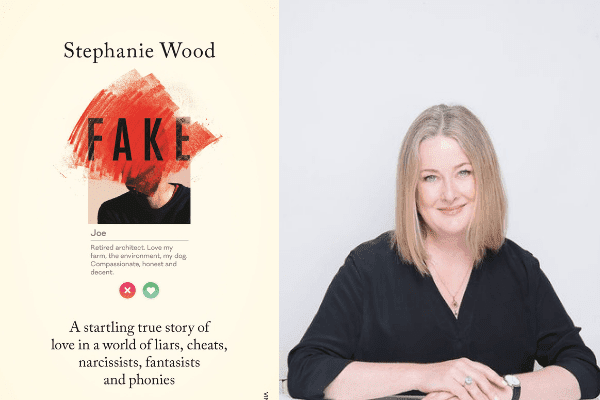He was honest, decent and loving.
Initially Stephanie Wood was tentative. The award-winning journalist and writer was apprehensive about dating, accustomed as she was in her late 40s, to life as an ‘I’ rather than a ‘we’. But she had dreamed and hoped for the latter.
“For too long I have been an I in a world of we,” she observed.
Finding the man of her dreams and living happily ever after was a fairy tale, that despite herself, she wanted. She wanted to be seen. She longed to be known.
It was thrilling to meet Joe, an understated and compassionate man, whom might fit the brief. Could he be The One? Stephanie couldn’t help but wonder.
They fell in love. Their relationship was exhilarating. They talked about the future – their future – the joy of it was utterly intoxicating.
They had been in a relationship for a little over a year and he was on the cusp of buying a new farm complete with grand homestead and abundant garden.
It wasn’t the wealth that excited Wood but the prospect of making and sharing a home. Being a we.
The journalist in Wood, trained to scrutinise and ask questions subjects don’t want, lay dormant. Her intuition was piqued, there were certainly questions she wanted to ask, which itself she realises is a crimson coloured flag, but the love she felt, the connection she longed for, rendered it more relaxed.
She swung between being desperate to investigate the various excuses he increasingly offered up, and wanting not to be paranoid, to simply accept that the man she loved had a busy life between his kids, his farm, his businesses and her.
But thing unravelled. Stephanie was beset by anxiety as more of Joe’s stories didn’t quite add up, his cancellations became more frequent, as did his no shows.
She soon discovered that worse than being unnecessary figments of her active mind her anxiety and paranoia were warranted.
Tall. Handsome. Fraudster. Fantasist. For a growing number of women, the man of their dreams has turned out to be anything but, as con artists congregate online to ensnare fresh victims. https://t.co/9j9P6k52HJ @smh @theage @StephanieAWood1 #fake #frauds #relationships #dating
— GoodWeekendMag (@GoodWeekendMag) June 29, 2019
It turned out Joe wasn’t an architect and he didn’t own any sheep, let alone a farm. There were no investments, no property deals and he certainly wasn’t honest or decent.
The whole time he and Stephanie were romantically involved, he was in another relationship. His life was a web of astonishing lies that Stephanie had been caught in.
It was devastating. The man she thought she was in love with didn’t exist.
Her heart was shattered and she was humiliated. She had lost love and face as she grappled with how she fell for a narcissistic con man.
In 2017 she wrote a feature for the Good Weekend magazine inside the Sydney Morning Herald and The Age on Saturdays about Joe.
The response was extraordinary: hundreds and hundreds of women got in touch with their own stories. The webs they had been caught in.
It was both relieving and terrifying to Wood to know she was not alone. In researching the story and in the responses the piece elicited, she discovered she was one of countless people to have fallen for manipulative and deceitful con artists who leave a trail of financial and/or psychological damage in their wake.
So I wrote this for Good Weekend mag, a follow-up to my 2017 piece on my devastating relationship with a con artist. He stole my belief in truth. I wanted to understand why we fall for these people + who the hell are these people. https://t.co/0ggFLiOmbC pic.twitter.com/6SgFiXa6PH
— Stephanie Wood (@StephanieAWood1) June 29, 2019
The feature led to an offer from a publisher to expand the work and the fruit from that labour, an exquisite and excruciating book recounting her experience, Fake, is published today. It is breathtaking and heartbreaking.
Kate McClymont describes it as a “…beautifully written account of the emotional wreckage caused by fraudsters of the heart. Stephanie majestically wields her literary scalpel to dissect and expose a manipulative, narcissistic con man.”
But more than that, aside from sharing her own fascinating experience of being conned, she weaves extensive research into the state of relationships, interviews with psychologists, love experts and other women who’ve suffered similar experiences seamlessly into the book.
Fake is Stephanie’s story but it certainly isn’t hers alone. She is far from the only intelligent, decent woman to have fallen prey to a fantasist. Think Dirty John, or Catfish, or Silicon Valley blood-testing ‘entrepreneur’ Elizabeth Holmes. Among us walk people without conscience whose capacity for deception has no limits. Their victims are everywhere.
Stephanie’s pain is palpable throughout Fake: it is clear this isn’t the book this gifted writer wanted to author. It is not the story she wanted to feature in, nor tell. But it’s a gift that she has.


